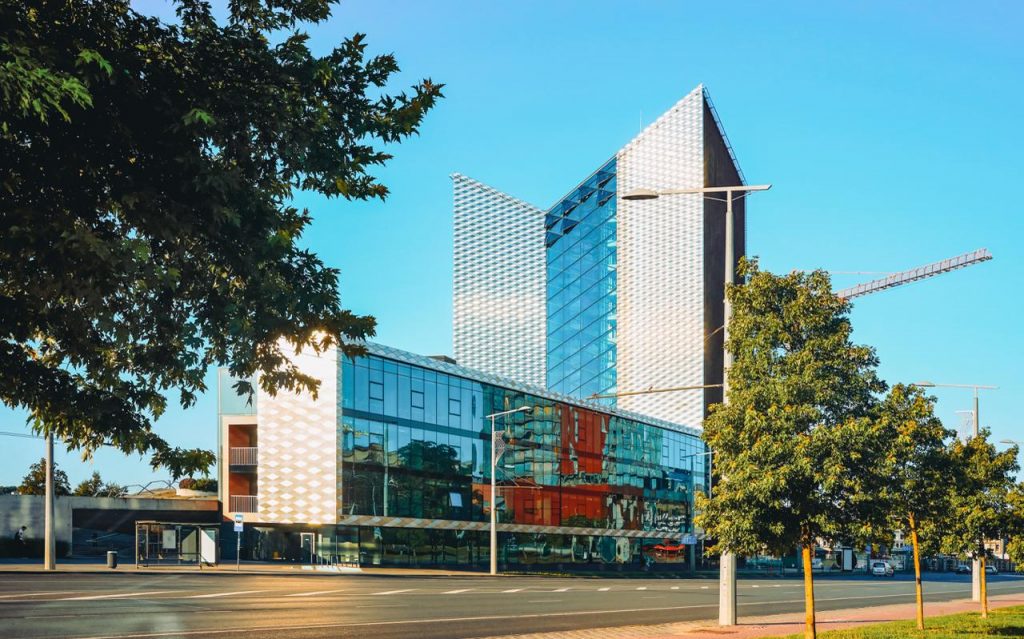
Tashkent Technopark: Uzbekistan’s Version of Belarus’s Hi-Tech Park
In recent years, Uzbekistan has been making confident strides towards developing an innovation-driven economy and embracing digital transformation. One of…
In recent years, Uzbekistan has been making confident strides towards developing an innovation-driven economy and embracing digital transformation. One of the key initiatives in this area is the Tashkent Technopark, which many already compare to the successful Belarusian project — the Hi-Tech Park (HTP).
Creating a favorable ecosystem for IT companies, startups, and scientific research has become a priority for countries striving to strengthen their global competitiveness. Like Belarus’s HTP, the Tashkent Technopark was designed to boost IT service exports, attract investments, and build a pool of qualified tech professionals.
In this article, we’ll explore what the Tashkent Technopark is, the advantages it offers to its residents, how it compares to the HTP, and what distinguishes it. We’ll also look at who might benefit from this model and what it takes to become part of it.
If you’re considering Uzbekistan as a potential location for growing your IT business, the Technopark could be a strong starting point.
What is the Tashkent Technopark?
The Tashkent Technopark is a modern hub designed to host and develop high-tech companies, R&D and production centers, startups, and innovative projects. It was launched as part of the government’s program to support Uzbekistan’s IT sector and digital economy. The goal is to stimulate the export of intellectual products, boost the country’s investment appeal, and advance local engineering and software capabilities.
Purpose and Government Support
The primary purpose of the Technopark is to create a business-friendly environment for high-tech industries, including information technology, industrial automation, biotechnology, and telecommunications. The Uzbek government actively supports the initiative by offering residents tax and customs incentives, infrastructure, administrative assistance, and access to subsidy programs.
The Technopark also plays a key social role, helping to develop human capital, create jobs, and integrate local IT businesses into the global tech ecosystem.
Core Areas of Activity
The Technopark is home to companies working in:
- Software development
- IT outsourcing and business process services
- Electronics manufacturing and smart device production
- Smart city solutions, fintech, agrotech, and logistics
- Research and development (R&D)
Startups receive particular attention, with access to accelerators, educational programs, and mentorship opportunities.
Infrastructure and Ecosystem
The Technopark provides residents with modern office and production spaces, conference halls, coworking areas, laboratories, data centers, and educational hubs. Flexible lease options and administrative support are also available.
The well-developed ecosystem includes:
- One-stop-shop services for dealing with government agencies
- Access to Technopark accelerators and investment funds
- Partnership programs with universities and global tech firms
- Networking events and business matchmaking opportunities
Formats of Involvement: Residents, Tenants, and Partners
Residents can be both local and international companies that meet the criteria regarding industry focus and business scale. They receive the complete package of benefits and support.
Tenants are organizations that utilize the Technopark’s infrastructure without obtaining resident status. They may lease office space and access resources on a commercial basis.
Partners include educational institutions, investors, international funds, and other organizations that contribute to the development of the innovation ecosystem and foster collaboration among Technopark participants and external markets.
Thus, the Tashkent Technopark is a core element of Uzbekistan’s technological infrastructure, focusing on exports, innovation development, and full-cycle support for IT businesses.
Key Benefits for Tashkent Technopark Residents
Resident status offers IT companies and tech startups significant advantages for running and growing their businesses. The core idea is to create an enabling environment where companies can focus on product and service development without being burdened by administrative barriers or excessive taxation. Below are the key benefits.

Tax Incentives and Preferences
Technopark residents are exempt from several taxes and payments, which significantly reduces financial burdens. Residents do not pay:
- Corporate income tax
- Value-added tax (VAT)
- Property and land taxes
In addition, a preferential regime applies to social contributions.
This model allows companies to reinvest more into growth, scaling, research and development, and to offer globally competitive services and pricing.
Simplified Administrative Procedures
Residents benefit from streamlined administration and reduced bureaucracy. The Technopark provides support at every stage — from application submission to day-to-day operations. Companies receive:
- Access to a one-stop-shop service for registration, licensing, and permits
- Fast-tracked procedures for hiring foreign specialists
- Simplified currency and international trade operations
This approach enables entrepreneurs to concentrate on strategic goals rather than routine paperwork.
Access to Educational and Acceleration Programs
The technopark maintains close cooperation with universities, training centers, and international accelerators. This provides companies with access to:
- Staff training and retraining programs
- Mentorship programs and networking with international experts
- Acceleration programs for startups and tech teams
Supporting talent and continuously developing competencies are among the key priorities of the technopark ecosystem.
Support for Entering International Markets
One of the technopark’s main goals is to promote the export of its residents’ services and products. Companies receive support in the following areas:
- Establishing international partnerships
- Participating in international trade fairs and business forums
- Attracting investments and grants from foreign funds
- Legal and marketing support for entering new markets
This is especially important for IT businesses targeting global audiences.
Government Interaction Through a One-Stop Shop
The technopark assists its residents with legal, organizational, and regulatory matters. Through a single service center, entrepreneurs can:
- Get consultations on current legislation
- Register amendments to founding documents
- Submit applications for licenses and permits
- Establish communication with relevant government authorities
This model significantly speeds up operations and reduces the risk of errors when dealing with government institutions.
Comparison with the Hi-Tech Park (HTP) in Belarus
The Tashkent Technopark is increasingly being referred to as an analogue of the Belarusian Hi-Tech Park (HTP), one of the most successful examples of IT cluster development in the post-Soviet space. Indeed, there are many similarities between these initiatives, especially in their core principles. However, there are also essential differences in legal frameworks, infrastructure, and resident admission models.
Shared Features: Goals, Governance Model, and Incentives
Both initiatives were launched by their respective governments to drive digital economy development, support IT service exports, and create a modern business environment. Their main goals are aligned:
- Stimulating growth in the IT sector
- Attracting foreign investment
- Developing talent and export capabilities
- Building an innovation ecosystem
Both the HTP and the Tashkent Technopark operate in coordination with government agencies, yet incorporate elements of administrative autonomy. Residents are offered similar tax incentives, including exemptions from corporate income tax, VAT, property tax, and other benefits. Simplified administrative procedures are also in place.
Key Differences: Legal Framework, Infrastructure, Admission Criteria
Despite their similar objectives, the structure of HTP and the Tashkent Technopark differs in several key areas:
- Legal framework: HTP operates under a special presidential decree that enables the application of unique rules in taxation, labor, and currency regulation. Uzbekistan, by contrast, still follows a more traditional regulatory model, with incentives integrated into the general system.
- Infrastructure: HTP is not tied to a specific location—residents can operate from anywhere in the country. The Tashkent Technopark, on the other hand, is a physical site where companies must be registered and often located.
- Admission criteria: Entry into HTP is stricter, emphasizing not only the business domain but also export orientation and project innovation. In Uzbekistan, the criteria are less formalized and more flexible, enabling rapid growth in the number of residents.
Export and Currency Regulation Approaches
HTP was designed with export in mind and features simplified currency regulations, including the ability to open foreign bank accounts and freely use foreign currency.
The Tashkent Technopark also emphasizes export, particularly to Central Asian and neighboring markets. However, currency regulation remains more conservative, and companies need more time to adapt to foreign trade requirements.
Nevertheless, the government is working on liberalization, and each year brings new support mechanisms for exporters, including subsidies, tax deductions, and direct access to investors.
Government Support and Regulatory Flexibility
Both HTP and the Tashkent Technopark benefit from government backing, but their regulatory approaches differ:
- In Belarus, HTP has operated under a stable and predictable regulatory environment for many years. However, recent increases in administrative and geopolitical risks may slow its development.
- In Uzbekistan, technopark policy is evolving dynamically with a focus on openness, digitalization, and improving the investment climate. The government aims to position the technopark not only as a growth hub but also as a platform for international collaboration.
Thus, the Tashkent Technopark and Belarus’s Hi-Tech Park share common principles but are implemented through different models: one is being built from scratch in a new economic reality, while the other is evolving as a mature IT cluster. Companies choosing between these jurisdictions can consider the differences in regulation, infrastructure, and export potential and leverage the advantages of both as part of their international strategy.
Who Can Become a Resident of the Tashkent Technopark
Obtaining resident status at the Tashkent Technopark grants access to a wide range of benefits, support mechanisms, and business opportunities. The eligibility requirements are clear and flexible, making the technopark an attractive option for both local and international IT companies, startups, and tech teams.
Requirements for Companies and Areas of Activity
To qualify for residency, a company must operate in one or more sectors that are prioritized within the digital and technology economy. Specifically, the technopark welcomes:
- Developers of software and mobile applications
- Companies working in AI, Big Data, and cloud computing
- Startups in fintech, agritech, medtech, and edtech
- Businesses engaged in e-commerce, digital platforms, IoT, and cybersecurity
Unlike the narrower specialization of the Hi-Tech Park (HTP), the Tashkent Technopark covers a broader range of industries, including scientific research, electronics manufacturing, process automation, and even certain high-innovation industrial projects.
Application Process
The application process is designed to be as straightforward as possible:
- The company submits a standardized application form describing its project, areas of activity, founders, and business plan.
- The application must include incorporation documents, information about current operations, and resumes of key team members.
- All materials are reviewed by the technopark’s commission, which decides whether to grant residency.
Interaction with the technopark administration can be conducted either in person or remotely. Preliminary consultations are also available, where prospective residents can receive guidance on assembling the required documentation.
Review Timeline and Selection Criteria
Applications are typically reviewed within 5 to 15 business days, depending on the complexity of the project. The commission evaluates:
- Whether the business area aligns with the technopark’s priorities
- Realism and potential of the business plan
- Estimated number of jobs created and salary levels
- Export potential or significance of the technology for the local market
The process is transparent and designed to encourage the entry of new participants, including young and promising teams.
Opportunities for Startups and Foreign Companies
One of the key strengths of the Tashkent Technopark is its openness to startups and foreign investors. It offers a supportive environment for small teams just entering the market, including:
- Preferential rental terms and infrastructure access
- Mentoring and acceleration support
- Participation in educational programs, hackathons, and pitch sessions
Foreign companies planning to open subsidiaries or branches in Uzbekistan can also benefit from assistance with registration, permits, and adaptation to local regulations. This is especially relevant for businesses seeking alternatives to traditional jurisdictions while maintaining access to CIS and Asian markets.
Practical Benefits of Resident Status
Becoming a resident of the Tashkent Technopark is more than a formality; it’s a practical tool for growing a business in a supportive legal and economic environment. Resident companies gain access to a range of tangible advantages that help reduce costs, streamline operations, and scale legally both locally and internationally.
Tax Optimization
Residents enjoy significant tax incentives that directly reduce financial burdens:
- Exemption from corporate income tax and VAT for specific transactions
- Personal income tax benefits
- Reduced social contributions, particularly valuable for labor-intensive companies
- Ability to reinvest saved funds into development without losing liquidity
For IT companies, where payroll is often the largest expense, these benefits greatly enhance budget flexibility.
Simplified Hiring and HR Management
Thanks to support from the government and technopark administration, residents can benefit from:
- Fast-tracked employment procedures, including for foreign nationals
- Legal recognition of flexible work formats, including project-based and remote work
In the competitive IT talent market, such advantages help companies scale teams quickly and retain key employees.
Foreign Currency and International Business Operations
Technopark residents enjoy simplified conditions for conducting international business:
- Ability to open foreign currency accounts, including outside Uzbekistan
- Simplified international payment procedures
- Favorable rules for dividend payments and profit repatriation
- Reduced currency control requirements for export contracts
These benefits are especially relevant for companies serving international clients, such as those in IT outsourcing or SaaS, where software is hosted on remote servers and delivered via subscription.
Legality of Remote Work and IT Outsourcing
One of the key benefits of residency is the official recognition of remote and distributed work, along with authorization to provide IT outsourcing in various formats:
- Serving international clients without a physical presence abroad
- Signing outsourcing contracts with payment in foreign currencies
- Managing teams and projects remotely
With clear regulations and support for digital business models, technopark residents can fully legalize remote operations while retaining access to state incentives.
Conclusion
The Tashkent Technopark is a modern platform for technology businesses, offering tax benefits, flexible regulations, and government support. Thanks to its well-developed legal framework and infrastructure, it’s becoming a strong alternative for companies seeking a stable, predictable environment for growth and scaling. It’s especially beneficial for IT businesses working with international clients, practicing remote models, and aiming to optimize their tax burdens.
If you are considering establishing a business in Uzbekistan and applying for technopark residency, our company can support you at every stage:
- Consult on technopark requirements and determine your eligibility
- Prepare the complete application package
- Provide full legal and accounting support
- Assist with hiring, taxation, currency operations, and service exports
- Offer turnkey business support tailored to local regulations
Get in touch — we’ll help you choose the optimal market entry strategy and ensure stable business operations in a new legal environment.
Our Blog
The latest news in our blog
“International Company” Status (for IT Companies)
For IT companies operating in international markets, the choice of jurisdiction and legal status is a critical factor for sustainable…
Congratulations on New Year 2026 from the EOR.by team!
Dear friends, partners and clients! The EOR.by team wholeheartedly wishes you a Happy New Year 2026! The past year has…
Decree on the High-Tech Park
The High-Tech Park (HTP) is one of the most well-known legal regimes in Belarus, which for many years has attracted…
Contact
We’re available for the new projects



